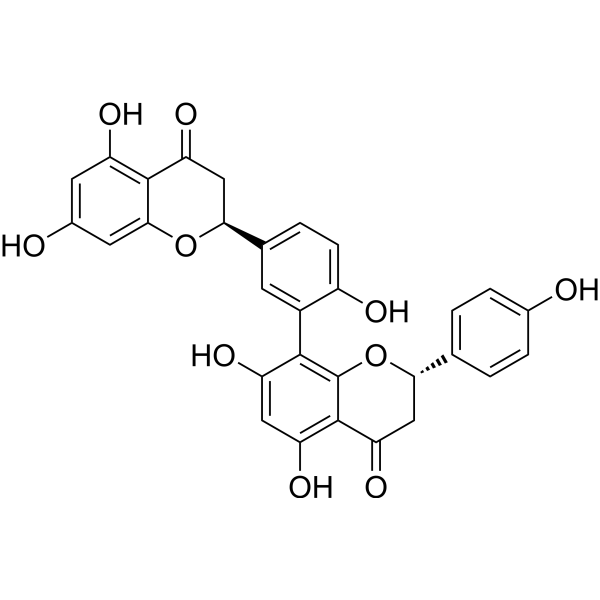
Tetrahydroamentoflavone
CAS No. 48236-96-0
Tetrahydroamentoflavone( —— )
Catalog No. M29347 CAS No. 48236-96-0
Tetrahydroamentoflavone is a potent XO inhibitor (IC50 = 92 nM, Ki = 982 nM) with anti-inflammatory effects. Tetrahydroamentoflavone can be used for studies about inflammation and gout.
Purity : >98% (HPLC)
 COA
COA
 Datasheet
Datasheet
 HNMR
HNMR
 HPLC
HPLC
 MSDS
MSDS
 Handing Instructions
Handing Instructions
| Size | Price / USD | Stock | Quantity |
| 100MG | Get Quote | In Stock |


|
| 200MG | Get Quote | In Stock |


|
| 500MG | Get Quote | In Stock |


|
| 1G | Get Quote | In Stock |


|
Biological Information
-
Product NameTetrahydroamentoflavone
-
NoteResearch use only, not for human use.
-
Brief DescriptionTetrahydroamentoflavone is a potent XO inhibitor (IC50 = 92 nM, Ki = 982 nM) with anti-inflammatory effects. Tetrahydroamentoflavone can be used for studies about inflammation and gout.
-
DescriptionTetrahydroamentoflavone is a potent XO inhibitor (IC50 = 92 nM, Ki = 982 nM) with anti-inflammatory effects. Tetrahydroamentoflavone can be used for studies about inflammation and gout.(In Vitro):Tetrahydroamentoflavone shows in vitro cyclooxygenase (COX) inhibition activity with an IC50 of 29.5 microM for COX-1 and 40.5% inhibition at 100 microg/mL for COX-2.
-
In Vitro——
-
In Vivo——
-
Synonyms——
-
PathwayChromatin/Epigenetic
-
TargetCOX
-
RecptorCOX
-
Research Area——
-
Indication——
Chemical Information
-
CAS Number48236-96-0
-
Formula Weight542.5
-
Molecular FormulaC30H22O10
-
Purity>98% (HPLC)
-
Solubility——
-
SMILESOc1ccc(cc1)[C@@H]1CC(=O)c2c(O)cc(O)c(c2O1)-c1cc(ccc1O)[C@@H]1CC(=O)c2c(O)cc(O)cc2O1
-
Chemical Name——
Shipping & Storage Information
-
Storage(-20℃)
-
ShippingWith Ice Pack
-
Stability≥ 2 years
Reference
molnova catalog



related products
-
Sodium salicylate
Sodium salicylate is a metabolite of acetylsalicylic acid, and functions by inhibiting NF-kB and reduces oxidative stress.
-
Glafenine
Glafenine is a non-steroidal anti-inflammatory drug (NSAID), is a non-narcotic analgesic agent, widely used for the treatment of pains of various origins..
-
Naproxen
Naproxen is a COX inhibitor for COX-1 and COX-2 with IC50 of 8.7 μM and 5.2 μM, respectively.



 Cart
Cart
 sales@molnova.com
sales@molnova.com


